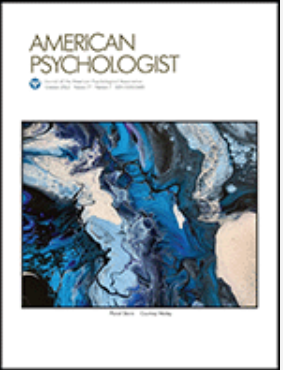Agent-based modeling for psychological research on social phenomena.
IF 12.3
1区 心理学
Q1 PSYCHOLOGY, MULTIDISCIPLINARY
引用次数: 0
Abstract
This article describes seven potential benefits of incorporating agent-based modeling (ABM) as a core research methodology for psychological research on social phenomena: building formal theories of complex social systems, validating multilevel causation, understanding temporal and nonlinear dynamics, demonstrating the completeness of theories, balancing consideration of people with their environments, bridging psychology and policy, and identifying unknown unknowns and the limits of prediction. Those benefits accrue from a resonance between how they approach questions and the questions they ask. For example, both rely on experiments to explore how individual interactions generate collective phenomena. The article compares micromechanism-driven and macropattern-driven ABM paradigms and introduces a new research approach-the minimal society paradigm-and a modeling strategy, principle-oriented modeling. This framework integrates ABM into psychological research, supporting both theory building through minimal societies and adaptation to specific contexts. Last, recent methodological developments in this field are discussed. (PsycInfo Database Record (c) 2025 APA, all rights reserved).基于主体的社会现象心理学研究模型。
本文描述了将基于主体的建模(ABM)作为社会现象心理学研究的核心研究方法的七个潜在好处:建立复杂社会系统的正式理论,验证多层次的因果关系,理解时间和非线性动力学,展示理论的完整性,平衡人与环境的考虑,连接心理和政策,识别未知的未知和预测的局限性。这些好处来自于他们处理问题的方式和他们提出的问题之间的共鸣。例如,两者都依靠实验来探索个体互动如何产生集体现象。本文比较了微观机制驱动和宏观模式驱动的ABM范式,并介绍了一种新的研究方法——最小社会范式和一种建模策略——面向原则的建模。该框架将ABM整合到心理学研究中,既支持通过最小社会构建理论,也支持对特定环境的适应。最后,讨论了该领域最新的方法论发展。(PsycInfo Database Record (c) 2025 APA,版权所有)。
本文章由计算机程序翻译,如有差异,请以英文原文为准。
求助全文
约1分钟内获得全文
求助全文
来源期刊

American Psychologist
PSYCHOLOGY, MULTIDISCIPLINARY-
CiteScore
18.50
自引率
1.20%
发文量
145
期刊介绍:
Established in 1946, American Psychologist® is the flagship peer-reviewed scholarly journal of the American Psychological Association. It publishes high-impact papers of broad interest, including empirical reports, meta-analyses, and scholarly reviews, covering psychological science, practice, education, and policy. Articles often address issues of national and international significance within the field of psychology and its relationship to society. Published in an accessible style, contributions in American Psychologist are designed to be understood by both psychologists and the general public.
 求助内容:
求助内容: 应助结果提醒方式:
应助结果提醒方式:


